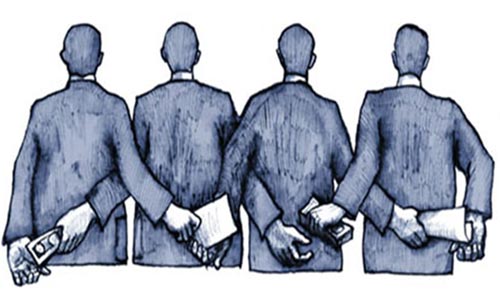Celebrating the international anti-corruption day on Monday, the NUG high ranking Officials including the president and vice president emphasized Afghanistan’s commitment to fight against corruption. In the same time, the Integrity Watch Afghanistan (IWA) releases their biennial survey showing no big changes in the fight against corruption in public’s mind. According to the IWA survey in 2018, 61 percent of respondents stated that they were either ‘very satisfied’ or ‘somewhat satisfied’ with the situation in their home provinces, compared to 54 percent in 2016. The report said 62 percent of those surveyed felt the government had not done enough to tackle these problems over the past two years —a slight decrease on the 67 percent who felt the same way in 2016.
While there has been a significant increase since 2016 in the number of respondents who say they would pay a bribe (33 percent up from 22 percent. The vast majority of Afghans (83 percent) believed that corruption had negatively affected the life of people in their local areas. In addition, the international community was increasingly the target of much criticism. More than half (52 percent) of those surveyed did not believe the international community wanted to fight corruption in Afghanistan, compared to 45 percent in 2016, 36 percent in 2014 and 37 percent in 2012.
However, the NUG government has made some efforts to combat against corruption, but these efforts have not yielded tangible results yet. These efforts have been largely focused on recruiting and competing on government positions. The officials from the Administrative Reform Commission have repeatedly spoken of their achievements and successes in the recruitment process, but that has not been reflected in society and has not found its place in the public’s minds. Even, if we talk about balance and justice in the field of the country’s recruitment system, it seems more ridiculous and joke in public opinion than a real word.
The reason for this is that the Administrative Reform Commission has focused on one section and one dimension only. Though their procedure is very good, there are many tales and question in the process. In fact, the combating corruption has many dimensions that seem to be still neglected. In the aforementioned ceremony, the vice president referred to another aspect of the fight against corruption, namely the formulation of 390 legislative acts within four years which has been drafted, approved or amended. He termed it a revolution in legal and regulatory field in the country. Nevertheless, it seems to be inadequate, and expectations are more than what has already been done. The reason for the dissatisfaction of public opinion is the depth of corruption and its extent, and more importantly, the existence of discriminatory structures and inequality that is rooted in the history of our country. All the work that has been done over the past years is, somehow, related to formal and apparent affair. But corrupt structures and corruptions substrates are still remaining. In recent years, we have been able to meet some of the expectations in the legislative part but in the administrative structure, we are still tied to the past.
The most important factor shaping a discriminatory and corrupt structure is a discriminatory mentality that is actively institutionalized in all administrative sectors of the country. Still, everyone in any position, think that the office under his control belongs to a particular ethnicity, which himself belong to. Still there are efforts to prevent certain ethnic and political groups from many of the country’s departments. For example, the security sector, ministry of foreign and overseas departments, the financial and economic sector, and the infrastructure sector are still prohibited areas for many citizens of the country. No one can hide the fact that the diplomatic apparatus and foreign affairs department of the country are still monopolized by a small number of those who are close relatives of senior politicians and senior officials.
Undoubtedly, in such situation the talents and meritocracy are killed. These are a few examples but many of the offices are in the same condition. Even the scientific and cultural institutions of the country are also suffering from the same condition. For example, along with dozens of scientific and research offices, there is an office called the “Academy of Sciences”, apparently they are responsible for the country’s scientific and research affairs but they are engulfed with a certain circle of monopoly that do not accept any kind of modernization. These are only parts of some structural corruption in the country’s administration, which has largely challenged the fight against corruption. Therefore, we can call the corruption in Afghanistan as a monstrous threat that still threatens our collective life, and we have a long way to go.
Undoubtedly, some of NUG initiatives are appreciated but the history rooted corruption needs historic will to bring deep and structural reform in the country. Structural reform is not only important in terms of fighting against corruption but also important in national trust and national unity. In addition, we need to push through key civil service reforms and ensuring the verification of asset declarations of all senior public officials and the imposition of sanctions for failure to register. The government should continue its recent progress in simplifying business processes and reducing red tape in order to further reduce the opportunities for administrative corruption. Areas which require further simplification include registering property, dealing with construction permits and enforcing contracts. Finally, government departments, business, civil society organizations and donors need to work together in the fight against corruption and to promote a culture of integrity within the civil service and society in general.
Corruption is like a ball of snow, once it’s set a rolling it must increase. – Charles Cateb Colton
Home » Opinion » The Difficulty of Fighting Corruption in Corrupt Structure
The Difficulty of Fighting Corruption in Corrupt Structure
| Mohammad Zahir Akbari

